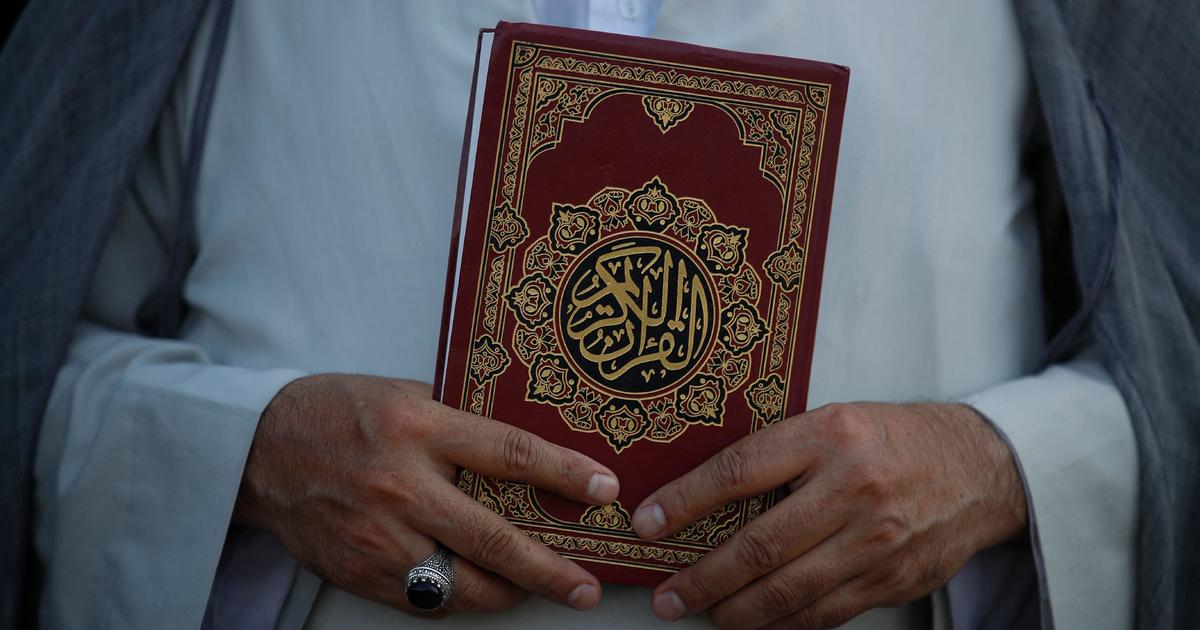Kuwait announced this week that it will print thousands of copies of the Quran in Swedish to be distributed in the Nordic country, calling it an effort to educate the Swedish people on Islamic “values of coexistence.” The plan was announced after the desecration of a Quran during a one-man anti-Islam protest that Swedish police authorized in Stockholm last month.
Kuwaiti Prime Minister Sheikh Ahmad Nawaf Al-Ahmad Al-Sabah said the Public Authority for Public Care would print and distribute 100,000 translated copies of the Muslim holy book in Sweden, to “affirm the tolerance of the Islamic religion and promote values of coexistence among all human beings,” according to the country’s state news agency Kuna.
On June 28, Salwan Momika, a 37-year-old Iraqi Christian who had sought asylum in Sweden on religious grounds, stood outside the Stockholm Central Mosque and threw a copy of the Quran into the air and burned some of its pages.
The stunt came on the first day of Eid-al-Adha, one of the most important festivals on the Islamic calendar, and it triggered anger among Muslims worldwide. Protests were held in many Muslim nations, including Iraq, where hundreds of angry demonstrators stormed the Swedish embassy compound.
CBS News sought comment from the Swedish Ministry of Foreign Affairs on the Kuwaiti government’s announcement, but did not receive a reply by the time of publication.
The U.S. State Department condemned the desecration of the Quran in Stockholm, but said Swedish authorities were right to authorize the small protest where it occurred.
“We believe that demonstration creates an environment of fear that will impact the ability of Muslims and members of other religious minority groups from freely exercising their right to freedom of religion or belief in Sweden,” State Department spokesperson Matthew Miller said. “We also believe that issuing the permit for this demonstration supports freedom of expression and is not an endorsement of the demonstration’s actions.”
The United Nations Human Rights Council adopted a resolution Wednesday condemning the burning of the Quran as an act of religious hatred. The U.S. and a handful of European nations voted against the resolution, which was introduced by Pakistan on behalf of the 57-nation Organization of Islamic Cooperation (OIC), arguing that it contradicts their perspectives on human rights and freedom of expression.



Thanks for clarifying that you’re not racist, but its curious that you describe the islamic world as savage, again centering yourself in the west as the enlightened and modern person. And who decided we are at the center of the world? Colonialist slave owners?
I didn’t mean to come across as someone who would turn a blind eye on any atrocities. Its just that the instability, and therefore violence that ravages the Middle East (maybe that’s what you mena by savage?), more often than not comes from coups or the imf restructuring those economies on behalf of the US and the EU. I have no explanation for the Saudis, not sure how they’ve got to that point. I don’t turn a blind eye on this violence, I just try my best to not put such a big group of people in the “bad” box. (at least thats how i make sense of this)
Also i’m 100% sure, at least most of the poor nations have the capacity to develop, and we can see that recently with at least some diplomatic ties being reinstated or made stronger (Iran - Saudi Arabia - Syria - …), and trade routes that escape the sanctions, which affect a really long list of poor countries. For a problem that is out of our control, its weird to expect that everything gets solved in 2 seconds, with rationality and friendship. Does this make sense or should i back this with some sources?
I mostly agree.
As for the backwardness of certain areas, I think that some of it is the result of Europe and North America meddling with them. But also, Europe and it’s offshoots had a lot of geographical advantages, like fetike arable land, that the Middle East (outside if the Fertile Crescent) never did.
Geography is not destiny, but it has a big influence. That might have been why Europe was able to industrialize and rule the world for a while. But the rest of the world is catching up.
I’ve heard something like this, but imo it’s only partly true. Why would anyone want to “rule the world” as you said? To me it seems like the feudal system, from wich colonialism was born, concentrated so many resources in the hands of very few people. It’s not just that europe was regularly ravaged by famines. It was the system on top of the disasters that worsened the scarcity situation, also with kings going to war on a yearly basis. This is the kind of trauma that lasted for centuries, and got embedded in our culture. I mean, to this day the relations of unequal exchange are still standing, as if that was just how trade works.
I don’t see anyone else in history trying to do imperialism, not even china or india in their golden period. And although even them had their own feudal periods, i struggle to believe it was as disastrous as in europe. Their rulers didn’t feel the need to conquer the world
You’re joking right? Let’s look at your examples. China has invaded Southeast Asia something like 17 times throughout its history. It dominated Manchuria and Mongolia for much of its history as well as the Tarim Basin area. The Aryans invaded ancient India and gave its current Indo-European religion as well as many of its current languages. Later, Buddhism was essentially driven out of the Indian Subcontinent, it’s place of origin, entirely as a result of holy wars.
Europe and its offshoots have run the world for the past couple hundred years mainly because for the first time in human history, technology has permitted globally spanning empires, not because their culture was any less expansionist or more ethnocentric than anybody else.
You’re naive, have an extremely limited knowledge of history.
The rest of what you have said seems like disjointed thoughts about how it isn’t fair that the material wealth isn’t evenly distributed on earth. I guess. I don’t really know what point you’re trying to make to me about it though. It’s an objectively true observation.